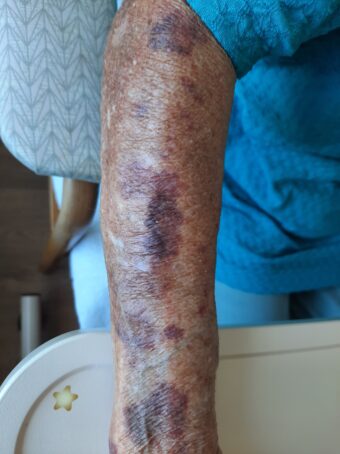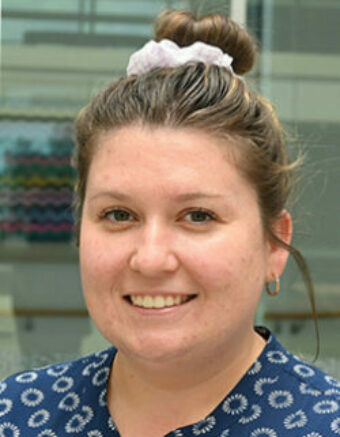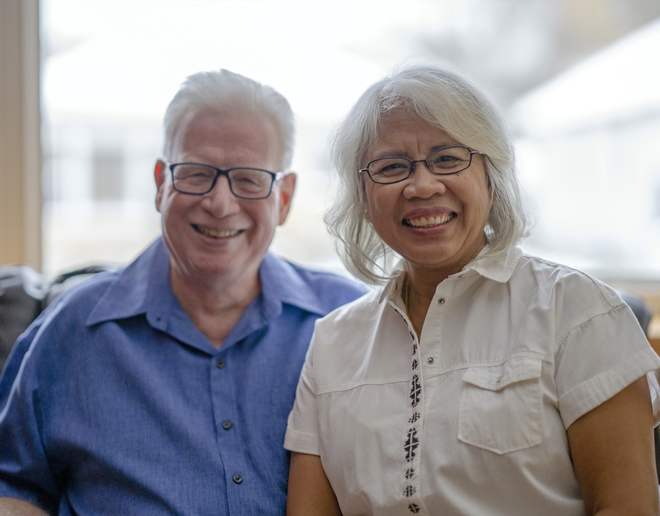Skin Injuries in older people
31 January 2023 in Residential Aged Care
Our 'let's talk about' series sees MYVISTA staff share their expertise in aged care
Preventing Skin Injuries in Older People by Rebecca Glass RN

Elderly people have an increased risk of skin damage and injuries due to the changes that occur in their skin as they age. These changes affect the skin’s integrity, making it more vulnerable to damage and injuries.
Skin injuries in elderly people can take a long time to heal and have a high risk of becoming infected. These injuries can cause pain and discomfort for the person and can restrict their ability to enjoy life and be involved in daily activities and social events.
These skin changes also affect the skin tissue surrounding the injury site, often resulting in significant bruising being very visible.
As skin ages it:
- becomes thinner and less elastic
- loses moisture and can become dry and more vulnerable to splitting and cracking
- develops folds and wrinkles
- loses its cushioning layer of subcutaneous fat
- has decreased sensory perception and is less likely to be able to detect temperature changes or pain
- has decreased temperature control so an older person is less able to regulate their body temperature
- is more easily injured as it is prone to tearing, pressure and bruising
- is slower to heal.
It’s important to be aware of avoiding skin injuries in older people in your care, particularly when you take a loved one out of residential aged care to attend events, appointments and social gatherings.
To help avoid pressure injuries:
- Encourage the person to reposition themselves every two or three hours. This could be done by standing up and going for a short walk. Or try choosing a different chair to sit in and changing position and posture often while seated.
- If the person is unable to reposition themselves then assist them to stand if they are able for two to three minutes so they relieve pressure on their bottom and encourage circulation. Alternatively repositioning can be managed using a slide sheet to reduce friction and sheer.
- Make sure when you are assisting the person that you use safe manual handling techniques to avoid injury to you and the person you’re helping.
To help avoid skin tears and bruising:
- Monitor the person’s skin integrity as you transfer them to and from cars and after they have been mobile.
- If they use a wheelchair, encourage them to have their lower limbs on the footplates and their upper limbs close to the trunk of their body while you wheel them.
- If you’re transferring the person from a wheelchair to another seat, check the breaks are on, both their feet are on the ground and the wheelchair footplates are pushed up and back away from where the person will be standing.
- Be conscious of hazards that could scratch them, particularly when they are mobile. Overhanging branches from shrubs or trees or clutter on the floor can be hazardous.
- Maintain regular toileting regime and after toilet hygiene, this includes regular changing and reapplying continence aids.
- Do not massage their skin and be very careful when holding or grabbing the person’s limbs.
- Be aware that your jewellery and nails can cause serious skin injuries.
- Don’t let dogs or cats jump up on the person legs as their claws can cause injuries.
- Make sure the person’s clothing fits correctly and sits as it is intended to on their body (for example that the back of their jumper isn’t folded up behind them). Be careful when you remove their clothing; do so slowly and carefully.
- Make sure the person’s footwear fits properly and won’t cause them to trip.
- Encourage the person to maintain their regular diet and keep their fluid intake up (unless informed otherwise by nursing staff).
- Elderly skin may be more sun sensitive so don’t spend long periods of time out in the sun. Find shade and use sunscreen and a hat.
- Ensure adequate lighting so they can see the path ahead of them.
- Remove small items of furniture in their way to avoid bumps or knocks.
- When you help the person in or out of a car make sure that they are free from the doors before they are shut and not at risk of the door closing back on them. Help them to have both of their own hands free so they can help support themselves as they get in or out.
- When the person is moving through doorways make sure the door can’t close on them. If they are in a wheelchair make sure their arms are within the wheelchair frame so they cannot be knocked or catch.
It’s vital to report skin injuries to care staff
Finally, if a skin injury, whether it is bruising, a skin tear or pressure sore, occurs while an aged care resident is in your care, please let a Registered Nurse at their aged care facility know immediately. MYVISTA will then be able to manage the injury. MYVISTA will also record this as incident for the person’s health records.



